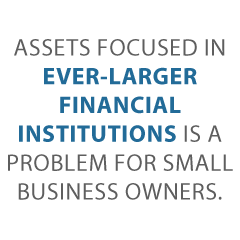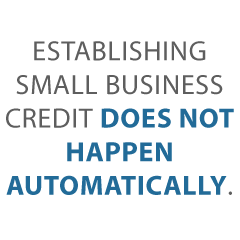COVID-19 threw our country into a recession that no one really saw coming. The drastic turn in the economy was jarring to say the least. Starting a business now can be scary. Here’s what you need to know about recession startup business loans and other funding options.
How to Find Other Funding Options Besides Recession Startup Loans
Small businesses continue to report problems finding credit. About 45% do not apply, most likely due to the fact that they do not need to. Another 20% don’t apply because they are discouraged from doing so. They either feel they will not qualify or they believe the process is too hard, and therefore not worth the time.
Small business owners report that competition among banks for their business came to a head from 2001 to 2006, and that this competition has declined from 2006 to the present.
But Wait, There’s More to Recession Startup Business Loans and the Economy

Even more concerning, according to one report, the number of American banks and thrifts has been decreasing slowly for 25 years. This is coming from consolidation in the marketplace in addition to deregulation in the 1990s, reducing barriers to interstate banking. What does that mean in layman’s terms? In short, recession is coming. Will you be able to find funding?
Assets focused in ever‐larger financial institutions is a problem for small business owners. Big banks are a lot less likely to make small loans. Economic declines usually mean financial institutions will become more mindful with financing.
The good thing for small businesses is, business credit does not rely on traditional financial institutions. What about recession startup business loans? How do you find them? Does such a thing even exist?
Hit the jackpot and weather any recession with our best webinar and its trustworthy list of seven vendors who can help you build business credit.
In the strictest sense, yes. I mean, startup business loans do not just disappear during a recession. They are just harder to get. Startups are a big risk, and few lenders are willing to take such risks, especially during a recession.
That doesn’t mean you should lose all hope however. There are options that can make it easier for you to qualify, and if you are still not able to get startup business loans, other types of funding do exist.
The Credit Game?
Lenders check credit to help determine whether or not a borrower is likely to repay the loan. It is an effort to reduce risk. If you have great personal credit, you are home free. No need to hunt, the loans will come to you whether there is a recession or not.
While credit is a good indicator of likelihood to repay, it is far from perfect. The problem is, for business loans, most owners have to rely exclusively on their personal credit. This is because, as a startup, they likely do not have any business credit yet. It is possible to have not so great personal credit and still be able to meet business obligations.
What Else Can Lenders Use besides Credit to Approve Recession Startup Business Loans?
There are a ton of potential borrowers out there that could be great for lenders. Unfortunately, they will never get a second look because of a poor personal credit score or non-existent business credit score.
Some lenders are willing to take other factors into consideration when they determine whether to approve business loans. They may look at credit, but they look at income, current debt, and length of time in business as well.
Often a business can get approval based on length of time in business and annual revenue. It is important to remember that startups can be as young as a couple of years. It does not have to be a brand-new business to qualify as a startup.
Most loans that do not require a great credit score do require at least 6 months in business. Some will go with 3 months. Few and far between are the loans that do not have a minimum time in business requirement.
Some lenders will get as personal as to ask why your personal credit score is low. If there is a personal situation that caused a decline in credit, telling them about it may help. In addition, if your score is low but has increased significantly, you should bring that to their attention as well.
For example, if you can show them that your score went low as a result of a health problem, but has increased 100 points since that problem was resolved, it can only help.
What Exactly Are You Hunting For?
Loans are hard to come by in a recession, period. Recession startup business loans may be some of the hardest to find. The key is to remember you are hunting more for the right lender, rather than the right loans. Not only that, but you may be better off looking for another type of funding all together. Here are some surprising alternatives to traditional lenders and loans.
Hit the jackpot and weather any recession with our best webinar and its trustworthy list of seven vendors who can help you build business credit.
Alternative Lenders
Alternative lenders are likely the best option when it comes to business loans in a recession. They are alternatives to the standard banks and credit unions. Many operate solely online. They often process applications in just a few days, and borrowers receive funds quickly.
The main difference in alternative and traditional lenders is that there are many occasions where they may not even do a credit check. Often, if you can show that you are generating sufficient revenue to repay the loan and interest, you are golden.
You do have to do your research still. Do not assume every loan an alternative lender offers is what you are looking for.
The interest rates with alternative lenders are generally higher, and the repayment terms are less liberal. They may also require a personal guarantee or collateral of some sort.
Despite the often less favorable interest rates and terms, these are a great option for those looking for recession startup business loans.
Crowdfunding as an Alternative to Recession Startup Business Loans
Crowdfunding is not technically a loan, though some crowdfunding sites offer a lending option. These are more in line with investments. This means you do not have to pay them back.
It won’t work for everyone. You have to set a goal for the amount of investment you want. With some sites, if you do not reach that amount, you do not get your funds. Other crowdfunding sites are more flexible, allowing you to take whatever you can get.
The main reason this doesn’t technically fall into the category of business loans is that the main product is not a loan. You do have to provide in depth information however, and most sites require you to offer backers an incentive for their investment. It is only fair to mention, also, that it may be harder to find those willing to participate in crowdfunding during a recession.
Angel Investors
Again, this isn’t a loan, but it is an option if finding recession startup business loans is proving difficult. The idea is very similar to that of crowdfunding, except you replace the crowd with one investor. Sometimes it is two or three investors. It is a few, and not a crowd, that provide the bulk of the funding.
It’s important to note that angel investing in your endeavor can be really informal. Even your mother can be an angel investor.
Invoice Factoring
If you have been in business long enough to have open invoices, invoice factoring could be an option. The lender is not concerned with your credit, because they will not be collecting from you.
They will pay you a discounted value for your open invoices and then attempt to collect the full amount from your customers. This is an excellent funding option, but it does not operate exactly the same as traditional loans.
Credit Line Hybrid
A credit line hybrid is the funding option many do not know about, and it is perfectly suited for business funding during an economic downturn. It allows you to fund your business without putting up collateral, and you only pay back what you use.
How hard is it to qualify? Not as hard as you may think. You do need good personal credit. That is, your personal credit score should be at least 685. In addition, you can’t have any liens, judgments, bankruptcies or late payments. Furthermore, in the past 6 months you should have less than 5 credit inquiries, and you should have less than a 45% balance on all business and personal credit cards. It’s also preferred that you have established business credit as well as personal credit.
If you do not meet all of the requirements, it’s okay. You can take on a credit partner that meets each of these requirements. Many business owners work with a friend or relative to fund their business. If a relative or a friend meets all of these requirements, they can partner with you to allow you to tap into their credit to access funding.
What are the Benefits of a Credit Line Hybrid?
There are many benefits to using a credit line hybrid. First, it is unsecured, meaning you do not have to have any collateral to put up. Next, the funding is “no-doc.” This means you do not have to provide any bank statements or financials.
Not only that, but typically approval is up to 5x that of the highest credit limit on the personal credit report. Additionally, often you can get interest rates as low as 0% for the first few months, allowing you to put that savings back into your business.
The process is pretty fast, especially with a qualified expert to walk you through it. One other benefit is this. With the approval for multiple credit cards, competition is created. This makes it easier, and likely even if you handle the credit responsibly, that you can get interest rates lowered and limits raised every few months.
Hit the jackpot and weather any recession with our best webinar and its trustworthy list of seven vendors who can help you build business credit.
Self-Funding with Friends and Family During a Recession
Your friends and family are often your best source of recession startup business loans. If they believe in your cause and have the funds, they may be willing. They may also be more flexible and generous in terms of interest rates and repayment terms. It never hurts to ask.
If you have savings or retirement funds available, there is no doubt you will have guaranteed approval with what’s called securities-based financing. An added bonus is that you can repay yourself, and if you choose to do so with interest, even a little, you could end up better off. If you need to take it more slowly, you can do that too. You can be as flexible as you want with yourself.
Avoid the Hunt for Recession Startup Business Loans
If you are weary of the hunt, start now working to establish and build business credit. Many times, this is an issue for the simple reason that business owners do not understand business credit and personal credit are not the same thing.
By working to establish a credit score for your business separate from your own, you make it easier to fund your business endeavors in the future.
First Things First
If you do not currently have business credit and need to get it established, there are some simple steps you can take to get started.
- Incorporate your business as a corporation, S-corp, or LLC.
- Get your business its own phone number and address separate from your own.
- List this information under your business name in all the directories.
These steps establish your business as its own entity separate from you and your finances. This is the essential first step to establishing business credit.
Build Strong Business Credit
This should be the ultimate goal. Once your business is its own entity, you can work on building, or repairing, bad credit. When that part is complete, you no longer have to worry about finding funding based on your personal credit alone. You will just be able to apply for a loan and negotiate for the best terms and rates.
How do you get there? First, make sure you are doing business with vendors that report to the credit agencies. Then, get whatever credit you are eligible for.
Even if you don’t need credit at the moment, get something. Make your payments on time, consistently. This builds a credit score where there was none before, and it can begin to repair a poor credit score.
A Successful Hunt Many Not Even Include Recession Startup Business Loans
There is always an obstacle to overcome. There is always a problem of some sort. Don’t let the finding recession startup business loans be the thing that keeps you from starting and running a successful business.
You may be able to find a loan, but if you can’t, there is more than one way to bag the prize. The alternatives to business loans for startup funding are numerous. If the regular weapons are not available for whatever reason, find another way. Take a look at alternative lenders, invoice factoring, merchant cash advance options, Crowdfunding, Angel Investors, or even friends and family.
Recessions come and go. It is the nature of the economy. No matter what, it just happens. It can be counted on the same way as the sunrise and sunset. Thankfully, it doesn’t have to bring success or progress to a halt. Explore your options and be diligent to find the funding you need for your business. You have to get creative and seek out alternative methods, and that is okay. Having a strong business credit score can definitely help also. Find out more about that here.
Just don’t give up. Remember, the key is to put yourself in a better situation so that once you survive the battle, you can win the war.
The post On the Hunt: Finding Elusive Recession Startup Business Loans appeared first on Credit Suite.







